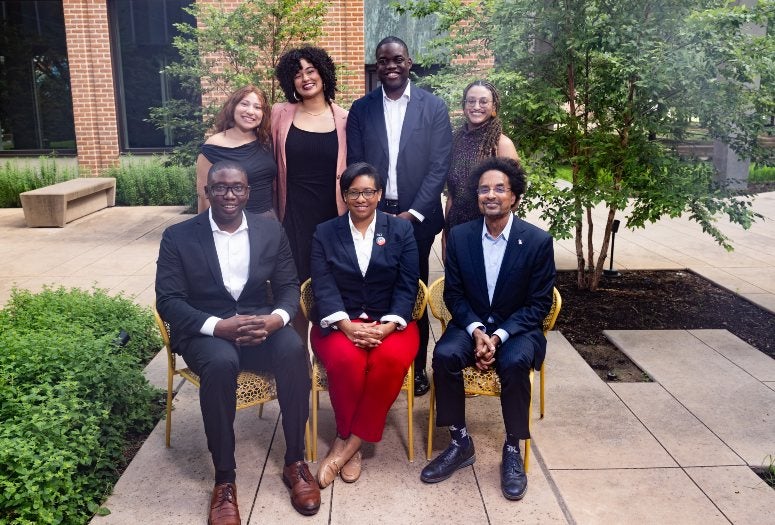⎯ By Rosie Nguyen
Special to Rice News
Rice University welcomed five distinguished alumni back to campus June 13 for the university’s fifth annual Juneteenth celebration. The event, featuring a panel discussion titled “Looking Back, Looking Forward: Leading in the Time of Black Lives Matter,” offered reflections and insights from former student leaders who navigated pivotal moments of leadership during the movement.
The panel consisted of Bernard Miller ’14, former president of Wiess College; Justin Onwenu ’18 and Kendall Vining ’22, former presidents of the Student Association; and Emani Brown ’21 and Malaika Bergner ’23, former presidents of the Black Student Association.
“Our Juneteenth commemoration not only pays attention and acknowledges the holiday, but it takes questions that Juneteenth brings to the surface. A lot of times, these are questions about democracy and leadership,” said Alexander X. Byrd ’90, vice provost for the Office of Access and Institutional Excellence.
Moderated by university historian Portia Hopkins, the discussion explored the panelists’ experiences at Rice, the evolution of their aspirations as students and as student leaders and how their time on campus shaped their current leadership practices.
“It went from just me kind of shouting individually to working with others and using our voices as a collective to actually send out a message,” Vining said. “I was made to slow down a little bit more and really lean on collaborating with others, not just peers but everybody who I could connect with around campus — faculty, staff, administrators.”
Onwenu echoed this collaborative spirit, emphasizing the importance of compassion and dialogue.
“I gained the practice of knowing how to inquire, ask questions and be curious at Rice,” Onwenu said. “I took those skills into my role as a community organizer in Detroit, where my whole job was to listen to community residents and understand at an instinctive level what is really frustrating folks and then try to come up with solutions.”
Panelists also shared effective strategies that helped mobilize support and facilitate change during their years at Rice.
“We reached out to Black alumni, the people who came before us to understand how they accomplished certain things and figured out what worked and what didn’t work,” Brown said. “That was huge because they are the people who walked this path before us.”
“It was helpful to build coalitions across different backgrounds, experiences and groups,” Onwenu said. “We see free speech on campus under attack throughout the country, but being willing to sit down with people who share a spectrum of beliefs was really important.”
The group of alumni reflected on how social media affected their work as student leaders during the Black Lives Matter movement. Some emphasized the advantage of being able to disseminate information quickly, bring awareness to lesser-known parts of history, and reach out to groups beyond campus.
“We were able to increase our connections with the University of Houston’s BSU as well as other students as Texas Southern University. Getting to talk to people beyond the hedges was really powerful and I don’t think we could have done that if we didn’t have Instagram to DM (direct message) each other,” said Bergner.
While acknowledging the novel benefits of social media, Miller highlighted the importance of always investing substantial time and energy in face-to-face interactions across campus.
Today, the alumni continue to embody their commitment to effective leadership and mentorship. Brown now works as a law clerk for the U.S. District Clerk for the Middle District of Georgia. Bergner is currently completing her Master’s degree in Urban Planning and Policy at the University of Illinois Chicago.
Miller is a healthcare regulatory and transactional attorney. Onwenu became the City of Detroit’s first Director of Entrepreneurship and Economic Opportunity and Vining now works at a law firm in Sacramento, California.
“This is how mentorship is supposed to work. You expose people to opportunity. They build from that opportunity and give back. Then they meet someone else and share the opportunity with them,” said Hopkins. “I hope that these alumni will inspire the next generation of Owls to soar high.”

